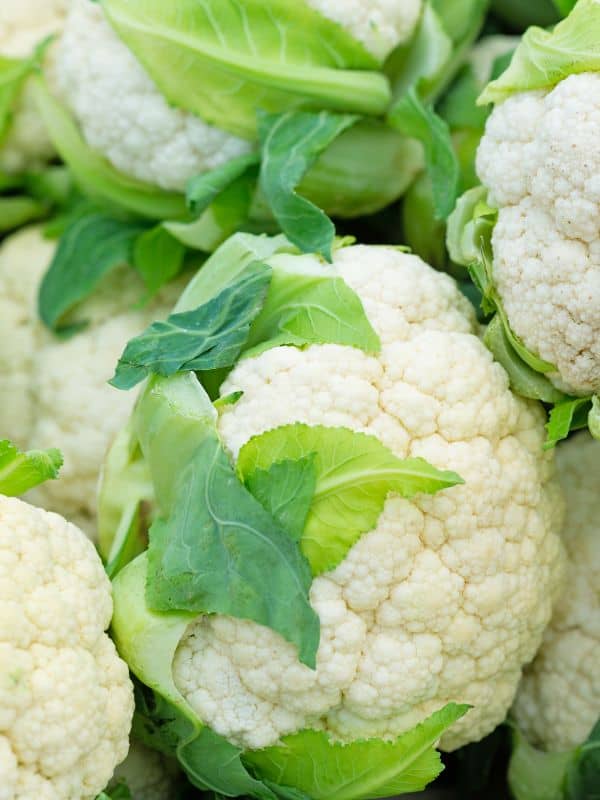Unveiling the Health Benefits of Cauliflower: A Nutritional Powerhouse You Shouldn’t Ignore

Cauliflower might not be the most celebrated vegetable at the dinner table, but its nutritional benefits and versatility in the kitchen make it a standout choice. Whether you enjoy it roasted, steamed, or transformed into a low-carb rice alternative, cauliflower offers impressive health advantages.
This cruciferous vegetable is a nutrient powerhouse that supports digestion, immunity, heart health, and more. Here’s a closer look at why cauliflower deserves a prominent place in your diet.

1. Supports Digestive Health
Cauliflower is a rich source of dietary fiber, essential for maintaining a healthy digestive system. A 100-gram serving provides approximately 2.5 grams of fiber, which helps regulate bowel movements and prevent constipation.
Beyond that, the fiber acts as a prebiotic, nourishing the beneficial bacteria in your gut. A healthy gut microbiome is vital not just for digestion but also for immune function and mental health. By including cauliflower in your meals, you can ease bloating, enhance digestion, and promote a balanced gut environment.
2. Boosts the Immune System
Packed with vitamin C, cauliflower delivers about 48 mg per 100 grams, making it a fantastic immune-boosting food. Vitamin C strengthens your immune defenses, helping your body fend off infections and illnesses.
Additionally, cauliflower contains antioxidants like glucosinolates and flavonoids that combat oxidative stress and inflammation. These compounds neutralize harmful free radicals, reducing your risk of chronic diseases while enhancing overall immune function.

3. Promotes Heart Health
Cauliflower supports cardiovascular health in several ways. It is rich in sulforaphane, an antioxidant known for reducing inflammation and protecting blood vessels.
Moreover, its fiber content helps lower LDL cholesterol levels, improving heart health. With about 142 mg of potassium per 100 grams, cauliflower aids in blood pressure regulation by balancing sodium levels. By incorporating cauliflower into your meals, you can reduce your risk of heart disease and support a healthy circulatory system.

4. Aids in Weight Management
At only 25 calories per 100 grams, cauliflower is an excellent food for weight management. Its high fiber content helps you feel full longer, reducing the temptation to snack between meals.
Cauliflower’s versatility also makes it an ideal substitute for calorie-dense foods. Use it as a base for pizza crust, a stand-in for mashed potatoes, or as a low-carb rice replacement. These swaps can help you cut calories without sacrificing flavor or satisfaction.

5. Enhances Detoxification
Cauliflower contains glucosinolates, compounds that activate detoxifying enzymes in the liver. These enzymes help your body break down and eliminate harmful toxins.
Sulforaphane, another key compound, enhances the liver’s detox pathways and reduces oxidative stress, supporting the body’s natural cleansing processes. Regularly including cauliflower in your diet can help your body detoxify and maintain optimal health.

6. Strengthens Bone Health
Cauliflower contributes to strong, healthy bones thanks to its vitamin K content. A 100-gram serving provides about 15.5 mcg of vitamin K, which plays a vital role in bone mineralization and calcium regulation.
In addition, cauliflower contains small amounts of calcium (22 mg per 100 grams) and magnesium, both essential for maintaining bone density. Together, these nutrients help reduce the risk of osteoporosis and other bone-related conditions, particularly as you age.

7. Exhibits Anti-Cancer Properties
Cruciferous vegetables like cauliflower are associated with cancer prevention due to their high glucosinolate content. When consumed, these compounds break down into active substances like sulforaphane, which have shown potential in inhibiting cancer cell growth.
Studies suggest that diets rich in cruciferous vegetables may lower the risk of cancers, including breast, colon, and lung cancer. While more research is needed, the evidence so far underscores the importance of including cauliflower in your meals.

8. Promotes Healthy Skin
Cauliflower’s benefits extend to skin health, thanks to its high vitamin C content. This vitamin supports collagen production, which is essential for maintaining skin elasticity and preventing premature aging.
Vitamin C also acts as a powerful antioxidant, shielding your skin from damage caused by UV rays and environmental pollutants. By eating cauliflower regularly, you can enhance your skin’s natural glow and resilience.
Ways to Incorporate Cauliflower Into Your Diet
- Cauliflower Rice: A low-carb alternative to regular rice, perfect for stir-fries or side dishes.
- Roasted Cauliflower: Toss with olive oil, garlic, and spices, then roast until golden for a delicious side.
- Mashed Cauliflower: Steam and mash with a touch of butter or olive oil as a substitute for mashed potatoes.
- Cauliflower Pizza Crust: Use cauliflower to create a gluten-free, low-carb pizza base.

Cautions and Precautions
While cauliflower is highly nutritious, some people may experience gas or bloating, especially when eating it in large amounts. Start with smaller portions if you have a sensitive stomach.
Additionally, cauliflower contains goitrogens, which can interfere with thyroid function when consumed excessively. If you have hypothyroidism or other thyroid-related conditions, consult your healthcare provider before making significant dietary changes.
Conclusion
Cauliflower is more than just a versatile vegetable—it’s a nutritional powerhouse that supports digestion, immunity, heart health, weight management, and more. By incorporating cauliflower into your diet, you can enjoy its many health benefits while experimenting with creative recipes.
Make cauliflower a regular part of your meals and experience the remarkable impact it can have on your overall well-being.